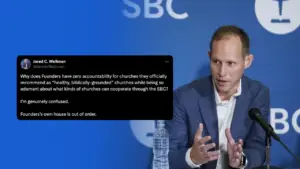How well do you know the music your church sings in worship? Can you think, for example, of a song that teaches that sin corrupts and deceives the heart? Or a song that unfolds the work of the Trinity in our salvation? If you were to measure the depth of doctrine and the breadth of truth in your church’s music for worship, what would you find?
In my last post we began considering ways that worship leaders can best prepare for the task of selecting music for worship. My first encouragement was know the Word. The first and best way to prepare for the task is to be regularly and diligently in God’s Word.
But second, and closely tied to the first, those who lead music in the church must know theology. Music is tied to theology—our songs instruct us. Music gives us voice to rehearse and remember the truth. It helps us rightly respond and rejoice in the truth.
Except for the preaching of the Word, no other ministry in the church has such a profound impact on shaping our understanding of truth than music. The music we sing helps us declare what is true about God, ourselves, and the world around us. And it embeds that truth in our thinking and in our lives. Paul makes the connection between music and truth in Colossians 3:16. He instructs us:
“Let the word of Christ dwell in you richly, teaching and admonishing one another in all wisdom, singing psalms and hymns and spiritual songs, with thankfulness in your hearts to God” (Colossians 3:16, ESV).
We want to sing and celebrate what is true. We want our music to support and undergird the teaching and preaching ministry of the church. For this to happen we must be wise and discerning in what we choose to sing. We must know the truth and be able to recognize lyrics that are rich in truth, lyrics that are light on truth, and lyrics that stray from the truth.
So commit yourself to study theology. Read sound, theological books. Learn to think theologically about your church’s music. Peruse and evaluate the lyrics of music you are using or considering for use in worship. Along with looking for quotes, allusions and connections to specific Scripture references in each song, ask yourself: What theological truths does this song teach?
One of the methods I have used to help me think theologically about music is to compile a Theological Index of Church Music. I started the index twenty years ago as a project for one of my PhD seminars in seminary. I created both an outline of theological topics and a list of song titles (psalms, hymns and spiritual songs) that we were singing at the church where I was leading worship. Then I created the index by working through the lyrics of each song, line by line, listing the song title under each entry in the outline that was stated or affirmed in the song. The resulting index provided a valuable resource, not just for selecting songs by theological topic, but for evaluating the scope and content of our church’s music.
You can find the Theological Outline here along with a list of some of the books I used to compile the outline.
I have resisted (for now) posting my full Theological Index of Church Music. I recognize that each church will have its own compilation of psalms, hymns and spiritual songs that it knows and sings well. I have also discovered that much of the benefit in having the list is the time spent creating it—thinking through lyrics and evaluating strengths and weaknesses.
Here, however, are a few entries from my opening questions:
Songs that teach that sin corrupts and deceives the heart
- All I Have Is Christ (Jordan Kauflin – Sovereign Grace Music)
- And Can It Be (Charles Wesley / Thomas Campbell – PD)
- No, Not Despairingly, Come I to Thee (Horatius Bonar – PD)
Songs that unfold the work of the Trinity in our salvation
- Heavenly Father, Beautiful Son (by Mark Altrogge – Sovereign Grace Music)
- Come Praise and Glorify (by Bob Kauflin / Tim Chester – Sovereign Grace Music)
- Wonderful, Merciful Savior (by Dawn Rodgers and Eric Wyse – Word Music)






















